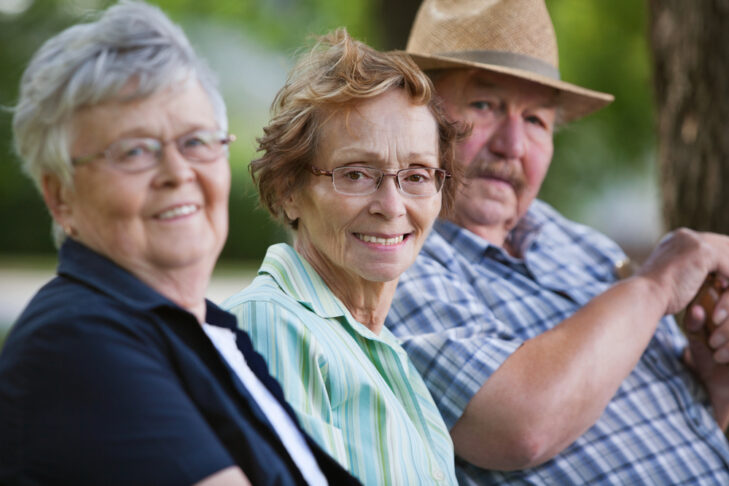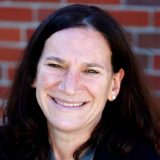“You shall stand up before the gray head and honor the face of an old man, and you shall fear your God: I am God.”
—Leviticus 19:32
Pre-COVID, our students were given the gift of visiting members of our senior community at Hebrew SeniorLife in person. During the pandemic, we did everything we could to continue this tradition. This year, we pivoted, once again, in order to form relationships with the residents of Hebrew SeniorLife—we met over Zoom. Each meeting, students prepared questions to ask the residents about universal topics like their favorite holidays and foods. Students encouraged their new friends to think way back to their fifth grade experiences in order to compare and contrast with the learning they are experiencing today at JCDS. Students learned about “ancient artifacts” such as rotary telephones and adding machines and watched commercials and advertisements from their childhoods.
COVID prevalence reached a safe-enough level last month, making it possible for a face-to-face visit. We realized when we went last month that we were not meeting strangers—we were connecting with friends! Fifth grade can participate in this program because of a generous grant called Better Together from the Legacy Heritage Foundation. Each year, they sponsor an essay contest, asking students to write about the impact the program has had on them. Each school chooses one internal winner and then all the essays are submitted to a national contest. Our very own Eve Menzin won the internal contest! Kol hakavod, Eve! You are invited to read Eve’s very personal reflections here:
Learning From the Elderly
By Eve Menzin, ’25
The Hebrew SeniorLife (HSL) program has helped my relationship with the senior citizens, which will connect me more to elderly people in general. I think that if I had not done this program, I would never have really interacted with seniors at all. I used to not know many seniors. I was a lot more shy with people. Now, I am much less shy with seniors. And I learned how to ask questions more. I also realized that seniors are just normal people.
Before I started this program, the only elderly people I really knew were my great aunt and uncle. (My uncle passed away a few years ago, so really only my aunt.) I had heard a lot about my other family members who had lived a long time ago. I had so many questions that I wanted to ask my extended family but being the shy kid I was, I didn’t ask. One example of when I was really shy with elderly people was when I was in fourth grade. I was going to a nursing home with my Girl Scouts troop on Halloween. When I got split into my group with two other people, I was too shy to say anything. I just stared at the floor until it was time to go. If I hadn’t done HSL, I feel like all of my interactions with seniors might have been like that.
HSL has taught me that I should not be afraid to ask questions. This is important because you can understand more about people. Also, sometimes people really like it. For instance, the Gemara says, “If his son is wise and knows how to inquire, his son asks him. And if he is not wise, his wife asks him. And if even his wife is not capable of asking or if he has no wife, he asks himself. And even if two Torah scholars who know the halakhot of Passover are sitting together and there is no one else present to pose the questions, they ask each other.” This is one of my favorite quotes from the Gemara because it shows that no one knows everything. Part of being wise is asking questions.
When I was asked to write questions, I always put my time and thought into them. I was usually the last one to turn them in. When I started HSL in school, I had a huge interest in World War II and the Holocaust. I had read 10 books that took place then. I also read five factual books. I read many articles in fourth grade. I even did a big project on FDR. That’s why when I started this program I sort of thought of the seniors as personal history question “answerers.” They could tell me exactly what I need. What could be better for me? Well, they were also friendly and I could talk to them like normal people.
After HSL, I can understand how seniors are just normal people. (Though at first they kind of felt like aliens.) Rabbi Akiva says to treat people how you want to be treated. HSL helped me treat elderly people, and think of the elderly, more respectfully. Also, it says that, “In the presence of an elder you shall rise from your seat and respect that elder.” HSL has helped me respect elderly people more. Which was actually really important because, looping back to what I said earlier about asking questions, the Mishna says that we should learn from everyone, especially the elderly. That is another reason it is important to ask questions to elderly people.
In conclusion, HSL has taught me that asking questions to seniors is good. Also, I learned that I shouldn’t be scared to ask questions because most of them like when I do ask questions. HSL has also shown me that seniors are normal people and have similarities to me. I learned from HSL to respect elderly people more. From HSL I have learned many helpful lessons, which will help me for the rest of my life.
This post has been contributed by a third party. The opinions, facts and any media content are presented solely by the author, and JewishBoston assumes no responsibility for them. Want to add your voice to the conversation? Publish your own post here. MORE



